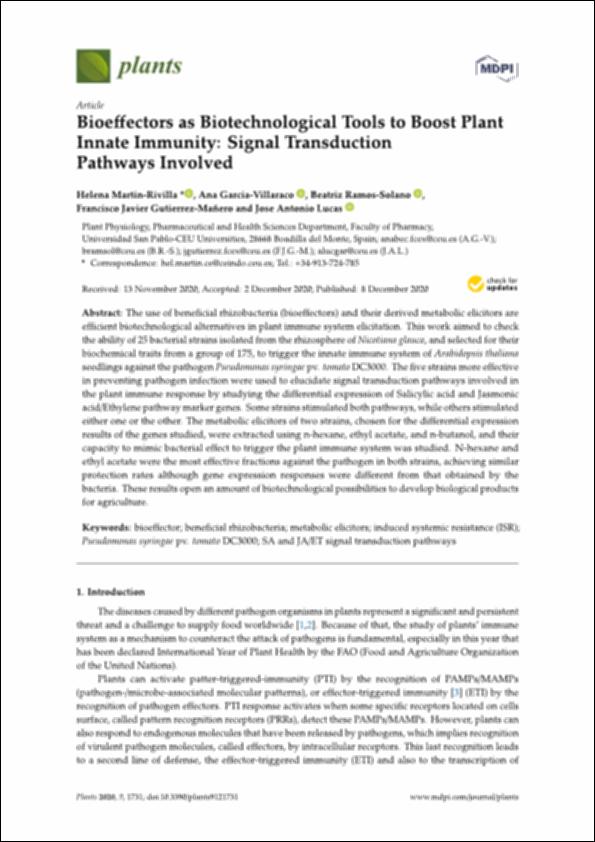Por favor, use este identificador para citar o enlazar este ítem:
http://hdl.handle.net/10637/15903Bioeffectors as Biotechnological Tools to Boost Plant Innate Immunity: Signal Transduction Pathways Involved
| Título : | Bioeffectors as Biotechnological Tools to Boost Plant Innate Immunity: Signal Transduction Pathways Involved |
| Autor : | Martín Rivilla, Helena Ramos Solano, Beatriz Gutiérrez Mañero, Francisco Javier Lucas García, José Antonio |
| Materias: | Bioeffector; Pseudomonas syringae; Metabolic elicitors |
| Editorial : | MDPI |
| Citación : | Gutierrez-Mañero, and Jose Antonio Lucas. 2020. "Bioeffectors as Biotechnological Tools to Boost Plant Innate Immunity: Signal Transduction Pathways Involved" Plants 9, no. 12: 1731. https://doi.org/10.3390/plants9121731 |
| Resumen : | The use of beneficial rhizobacteria (bioeffectors) and their derived metabolic elicitors are efficient biotechnological alternatives in plant immune system elicitation. This work aimed to check the ability of 25 bacterial strains isolated from the rhizosphere of Nicotiana glauca, and selected for their biochemical traits from a group of 175, to trigger the innate immune system of Arabidopsis thaliana seedlings against the pathogen Pseudomonas syringae pv. tomato DC3000. The five strains more effective in preventing pathogen infection were used to elucidate signal transduction pathways involved in the plant immune response by studying the differential expression of Salicylic acid and Jasmonic acid/Ethylene pathway marker genes. Some strains stimulated both pathways, while others stimulated either one or the other. The metabolic elicitors of two strains, chosen for the differential expression results of the genes studied, were extracted using n-hexane, ethyl acetate, and n-butanol, and their capacity to mimic bacterial effect to trigger the plant immune system was studied. N-hexane and ethyl acetate were the most effective fractions against the pathogen in both strains, achieving similar protection rates although gene expression responses were different from that obtained by the bacteria. These results open an amount of biotechnological possibilities to develop biological products for agriculture. |
| URI : | http://hdl.handle.net/10637/15903 |
| Derechos: | http://creativecommons.org/licenses/by-nc-nd/4.0/deed.es Open Access |
| ISSN : | 2223-7747 |
| Fecha de publicación : | 8-dic-2020 |
| Centro : | Universidad San Pablo-CEU |
| Aparece en las colecciones: | Facultad de Farmacia |
Los ítems de DSpace están protegidos por copyright, con todos los derechos reservados, a menos que se indique lo contrario.


